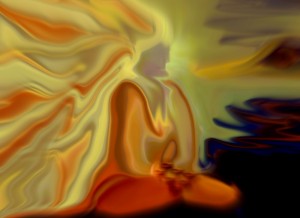It’s near dusk, and the parkland seems to be full of Cooper’s hawks. At one point on the path, a large, brown, stipple-winged hawk takes off from the path ahead of me with some small animal in its mouth.
 Another hawk, perched on a branch overhanging the park road, drops from the limb and screeches incessantly as it glides in straight, level flight above the closed park road. A few minutes later, a couple walking ahead of me stop and turn around to watch a raptor alight high in a sycamore tree, and we exchange a few friendly words.
Another hawk, perched on a branch overhanging the park road, drops from the limb and screeches incessantly as it glides in straight, level flight above the closed park road. A few minutes later, a couple walking ahead of me stop and turn around to watch a raptor alight high in a sycamore tree, and we exchange a few friendly words.
A hundred meters up the path I pass two college-age couples talking non-stop as they imbibe at a picnic site adjacent to the footbridge. In the time it takes me to go by, one of the young women changes subjects three times, without appearing to take a breath.
For 20 minutes during a sitting by the stream, a gray squirrel chatters away in a tree behind me. Consciousness is like that squirrel prattling on.
Inclusive, undirected attention quiets the mind, not any form of concentration. Meditation cannot truly begin until the mind/brain lets go of its attachment to thoughts and the idea of a separate self. No trick or technique can make it do so. Only undivided observation loosens the shackles and ends the grooves of thought.
Why is it so difficult to let go? What is it about the human mind that keeps us attached to beliefs, people and problems? It appears as though the brain, using thought, is almost wired to attach itself to things. Clearly, attachment in the nature of thought itself.
Attachment is also a function of the self. As long as there is the emotionally held idea of ‘me,’ there will be attachment with all the suffering it engenders.
There is no separate entity that stands apart from anything, yet the self remains the most important thing. We live as though there is a seemingly separate self that experiences things as happening to it, rather than a stream of events, reactions and responses that are simply happening.
The ‘me’ seems to have tremendous validity. The brain, using thought, fabricates a separate self, and holds onto it for dear life, though the self doesn’t actually exist as a separate thing. The ancient habit of separation extends to ‘my country’ and ‘my group,’ producing incalculable death and destruction. The separate self is a tremendous mystery, one that can and must be resolved, but neuroscience is not even asking these questions. Indeed, science venerates the self.
Why does the ‘me’ continue to have so much power? Why isn’t experience perceived as an unbroken flow of inner and  outer movement, without division, but seen instead in terms a center that’s fixed? Is an illusorily separate self that interprets and judges an unchangeable part of being human? I’m sure it isn’t.
outer movement, without division, but seen instead in terms a center that’s fixed? Is an illusorily separate self that interprets and judges an unchangeable part of being human? I’m sure it isn’t.
The expression, ‘my thoughts’ is not merely redundant–it is existentially and neurologically nonexistent. When there is no sense of self, there is no basis for attachment. Therefore attachment, and all the suffering it engenders, is a function of the ‘me,’ the ego, the self at the center of experience.
Is it that the brain records experiences, and an operating system called ‘me’ evolved to subconsciously run the computer of thought? Is it that in the absence of self-knowing, attention, and insight into the nature of thought, the program of a separate self brings some semblance of order and stability to the chaos of thought?
Another possibility is that as humans evolved conscious thought, the survival instinct became deeply linked to concepts of identity. Instead of realizing that ‘I am my thoughts,’ and ‘we’ aren’t separate from ‘them,’ there was and continues to be the subconscious and emotionally held idea that ‘I’m not my thoughts, but a separate entity,’ as well as ‘us vs. them.’
From this psychological basis, the idea of permanence, and the fear of death, are inevitable. Separate selfhood, the survival instinct, attachment, permanence, and fear of death therefore all go together, and form the psychological basis of our dubious humanness.
Since thought-dominated consciousness has become utterly dysfunctional however, both individually and collectively, consciousness has to have a different meaning and foundation for the human being to emerge and humanity to develop.
Authentic meditation awakens this other kind of consciousness altogether. And to ignite meditation, one has to begin with division in observation. That is, by watching the watcher, unwilled attention halts the habit of psychological separation, if only for a few essential minutes a day.
Thought is a single stream, which, being an adaptation of separation, habitually separates itself from nature, the world, and itself with inattention. But when, through passive observation and attention, the habit and sense of separateness ends, thought falls silent and separation ends. Then there is “the peace that passes all understanding.”
Martin LeFevre

